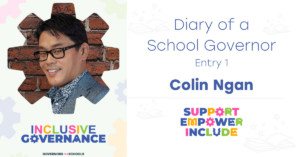
As part of this year’s Inclusive Governance campaign, we’re asking a range of governors to provide diary entries detailing their experiences in the role. As well as gaining first-hand insights into people’s diverse governance journeys, we’ll explore how boards are addressing issues surrounding diversity and inclusion.
First up is Colin Ngan. Colin took up his school governance role in 2017 and was subsequently co-opted by the board. He currently chairs and sits on several different committees as part of a primary school governing board.
Entry 1. September 2023
After ending the last academic year on a high (taking the entire school to the beach) and as the teaching staff wound down for a well-deserved break and the children turned off their daily screen time limits for the summer(!), I settled in for a quiet six-weeks away from thoughts about school oversight, financial reports, and performance data.
However, it was not quite to be. Governors for Schools met with me in August and asked for ‘Diary of a Governor’ entries covering the first term of 2023-24. I spent the summer wondering whether I’d have enough to write about. So, here goes!
A fulfilling month began even before our pupils returned. The first day of term was an ‘inset’ day. For the uninitiated, this is short for ‘in-service training’ whereby teaching staff go into school without any pupils present to do training, planning, etc. I joined a subject close to my heart – diversity and inclusion.
Inset day training
Entitled ‘From Differentiation to Adaptive Teaching’, an interactive workshop was delivered with passion by our new Deputy Head, reminding everyone why we need to adapt plans and materials to suit the needs of classes and avoid setting fixed pupil groups and ‘labelling’ pupils. The workshop explored the importance of being an ‘inclusive practitioner’ and being able to consider whether a particular piece of work enhances or restricts learning, further recognising that the exact same strategy can be simultaneously inclusive and exclusive – teaching should be adapted in response to learners.
As a key focus for the school, more diversity and inclusion training was arranged for the second week of term. Thankfully, it was presented after-hours and online, so I was able to catch the content despite being out of the country for work (a great example of how, as a governor, commitments to the school can be juggled with work priorities and home life). This additional training was about anti-racism.
It is worth considering for a moment the crucial role governors play in the recruitment of teaching staff. With only 5% of school governors from a minority-ethnic background – and only 7.3% of headteachers (in state-funded schools in England) from minority-ethnic backgrounds – it is little surprise that monocultural governing boards tend to choose senior school leaders who look and sound like them. I am fortunate to oversee a diverse school with inclusion at its core.
This training at the start of the school year was insightful learning for all, especially as our teaching staff spend the first month of the new school year getting to know their diverse classes, and governors—with the school’s senior leaders—review and analyse the previous year’s collated data, to help finalise school development plans and priorities for the year ahead and ensure inclusive resources incorporate everybody.
Going into the third week, it was thrilling to see the BBC write an article about the ‘bike bus’ set up by parents of the school. Our pupils and parents gather at a local park and form a huge convoy riding to school, usually with a cacophony of horns, bells, and whistles! It is great for the community and for the environment – and aligns beautifully with our Unicef UK Rights Respecting Schools Award. Our gold status award was achieved with the combined effort of committed governors, staff and pupils; it means we can evidence having embedded human rights into the school’s ethos and culture, and that we collaborate to develop and maintain a school community based on equality, dignity, respect, non-discrimination, and participation.
We have achieved these things together over the years, transforming our school into a bubbling melting pot in the community, where every child feels a sense of belonging. Our school’s motto is: “all different, all equal, all smiling”, each day is a testament to how diversity, when paired with inclusion, can foster creativity, open-mindedness, and mutual respect – vital skills for the leaders of tomorrow.
If you’re feeling inspired by Colin’s story, why not take the first step toward a governance role by registering with Governors for Schools? One of our friendly team will guide you through the application process and match you up with a school in need.
Read Colin’s next Entry